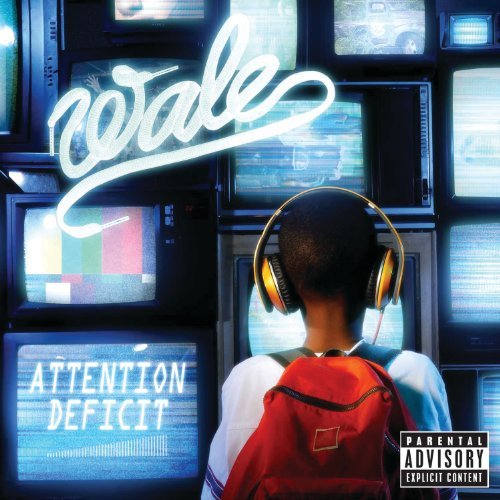
Wale
Attention Deficit
Release Date: Nov 10, 2009
Genre(s): Rap
Record label: Interscope/Allido
Music Critic Score
How the Music Critic Score works
Buy Attention Deficit from Amazon
Album Review: Attention Deficit by Wale
Very Good, Based on 8 Critics
Based on rating 8/10
A quick-witted and diverse rapper able to deliver punch lines at breakneck speed, Washington, D. C. 's Wale debuted and then thrived in the underground mixtape world, releasing a handful of well-received full-lengths before getting to work on his official major-label debut.
Based on rating 8.0/10
It seems odd that a young mixtape rhymer from Washington D.C. --- a city not exactly known for breeding hip-hop heavyweights --- would blossom into a virtual megastar over the course of a year, but then, the world of rap is becoming increasingly odd. (Gucci Mane is the genre’s biggest cult hero? Kid Cudi is making better records than Jay-Z?) Wale, for one, is reaping the benefits: 18 months after his Seinfeld-inspired juggernaut The Mixtape About Nothing, this 25-year-old tongue-twister has reached Lil Wayne levels of omnipresence.
Based on rating B
Several excellent mixtapes have won Wale a reputation as a smart lyricist in an age of dumbed-down ringtone rap. He often lives up to that promise on his major-label debut, tossing out deep thoughts and show-offy puns over beats that pay homage to the go-go of his native D.C. Yet Attention Deficit is marred by intermittent efforts to conform to a misogynist mainstream-rap blueprint.
Based on rating 7/10
It almost seemed like this day would never come: after a series of five increasingly hyped mixtapes, Washington D.C. rapper Wale has finally unleashed his oft-delayed debut LP, Attention Deficit. In many ways, his career arc thus far speaks volumes about the brave new world of music distribution, where publicity is paramount and physical product is worthless.
Based on rating 7.0/10
On major label debut, mixtape star looks to the West Born of Nigerian parents in our nation’s capitol, Wale rose to prominence in 2008 with The Mixtape About Nothing, where he used his favorite program as a framing device for his technically adroit diatribes on race, rap, and authenticity. “The Kramer,” for instance, sampled Michael Richards’ infamous Laugh Factory tirade, and subsequent apology, to bookend a fearless dissection of racist language. Wale also adopted Seinfeld’s habit of knowing self-deprecation to send up stale rap conventions, titling a track with three guest stars (including mixtape staple Bun B) “The Feature Heavy Song,” continuing from there to check all the boxes: “The Freestyle,” “The Skit,” “The Remake of a Remake,” and even “The Cliché Lil Wayne Feature.
Based on rating 6.6/10
It's no secret that the Internet is hurting rappers. Hurting their record sales. Hurting their ability to control narrative. And, perhaps most crucially, hurting their ability to self-edit. Flip cam freestyles, track-a-day mixtapes, local radio interviews delivered worldwide. Reining it in has ….
Opinion: Very Good
BON JOVI“The Circle”(Island) The repurposed “Livin’ on a Prayer” bass line on “Work for the Working Man,” from Bon Jovi’s 11th studio album, “The Circle,” is no casual rehash. In 1986 “Livin’ on a Prayer” marked Bon Jovi as a band that grappled with meaning, or at least pretended to, in between hairspray sessions and breaking hearts. Twenty-three years later Bon Jovi has become that band in full, having long ago cleansed its system of vice and CFCs.
Opinion: Mediocre
There was a lot of potential for Wale, a D.C.–based rapper that had a world of opportunities in front of him. In typical fashion, employing their eye for talent and ear for music, The Roots featured him on Rising Up’s bumping, lively closer, “Rising Down.” After Black Thought had set everything up for him with a few high-caliber verses and Chrisette Michele (another singer The Roots brought to the forefront,) did her share of fine singing, Wale was allowed to show up, deliver a few smart lines and then hide away while the rest of the band jived and grooved away. A modest entry-way into the highly competitive world of hip-hop MCing, it opened a few doors that led to variously different journeys.
'Attention Deficit'
is available now

